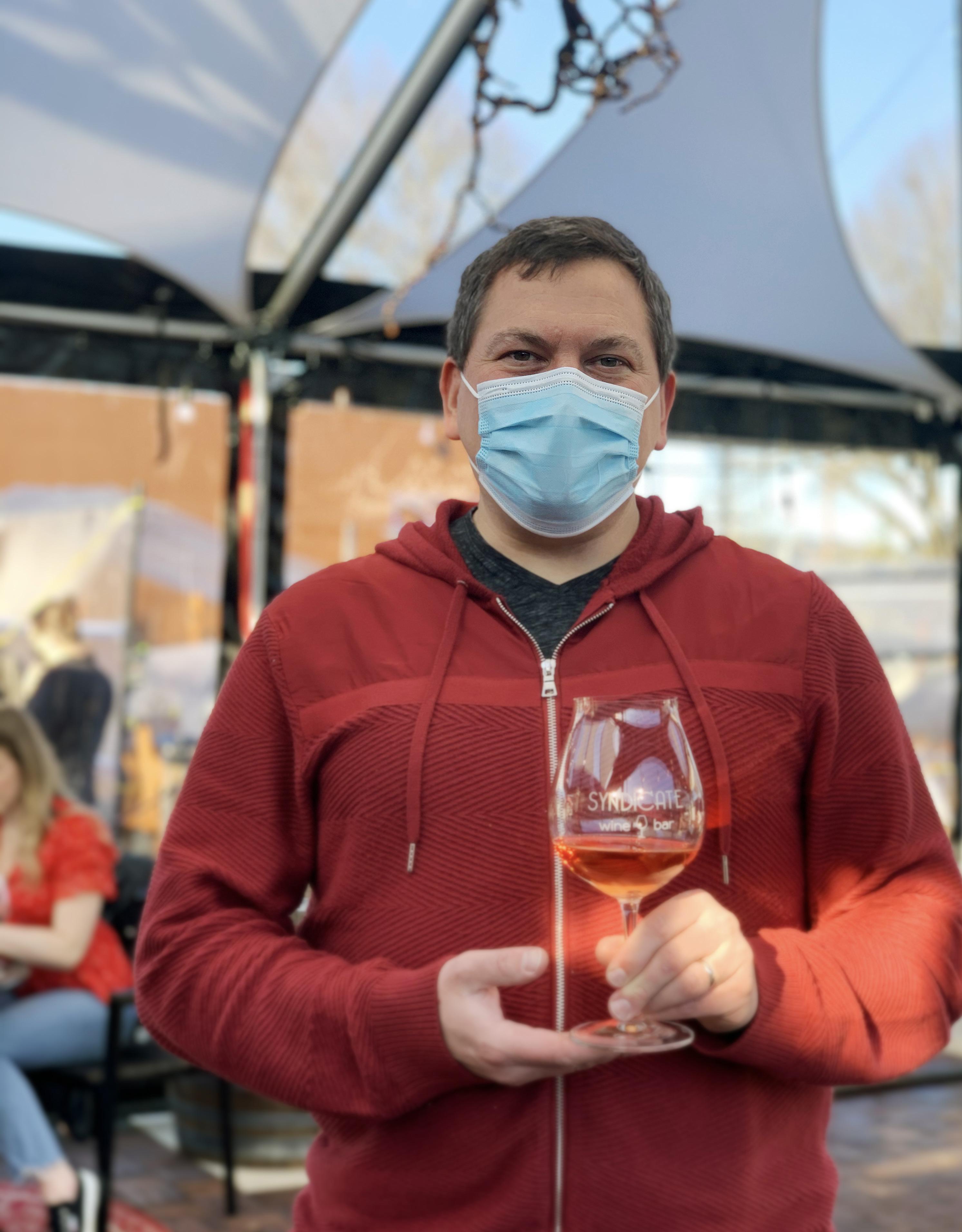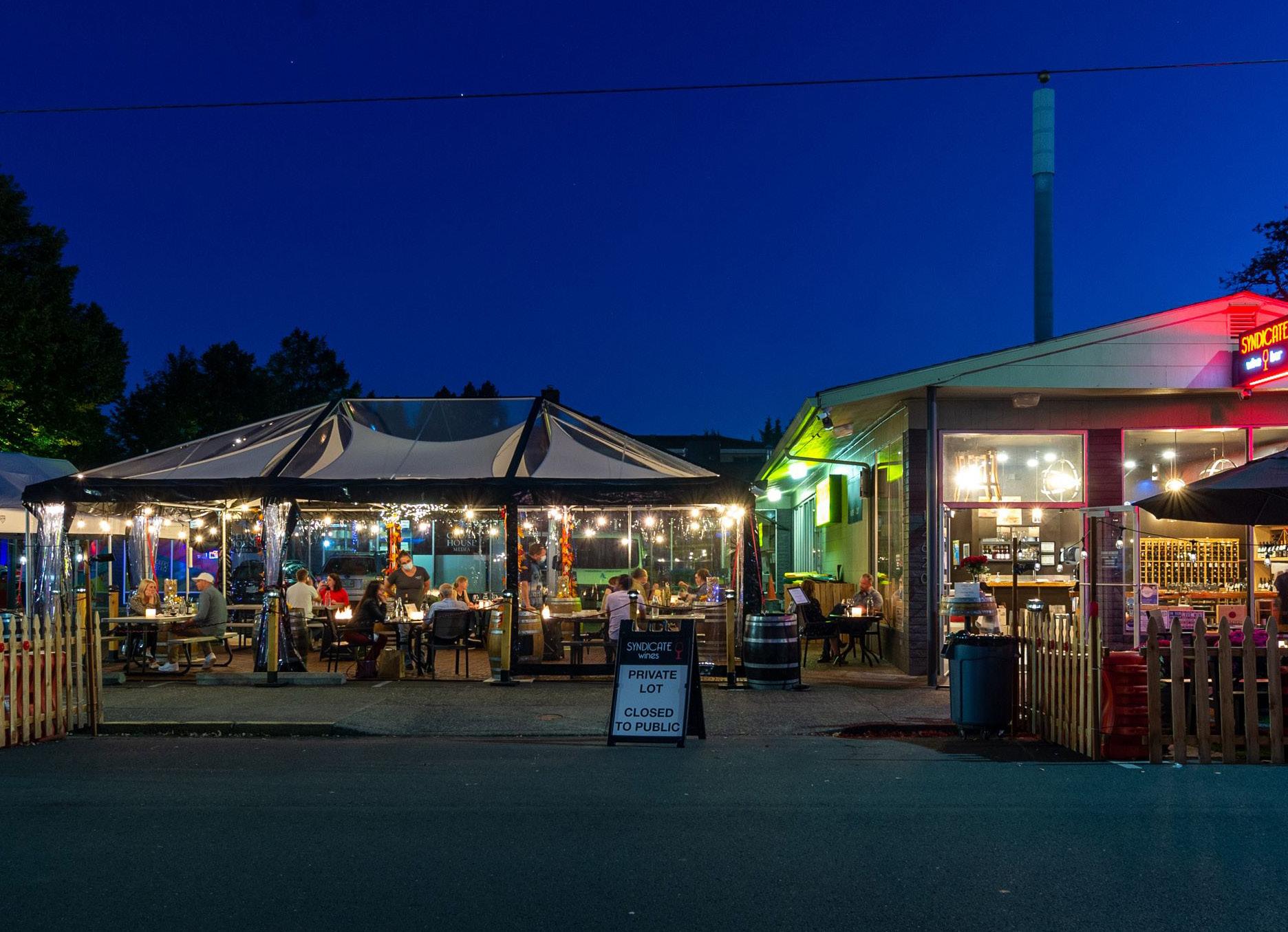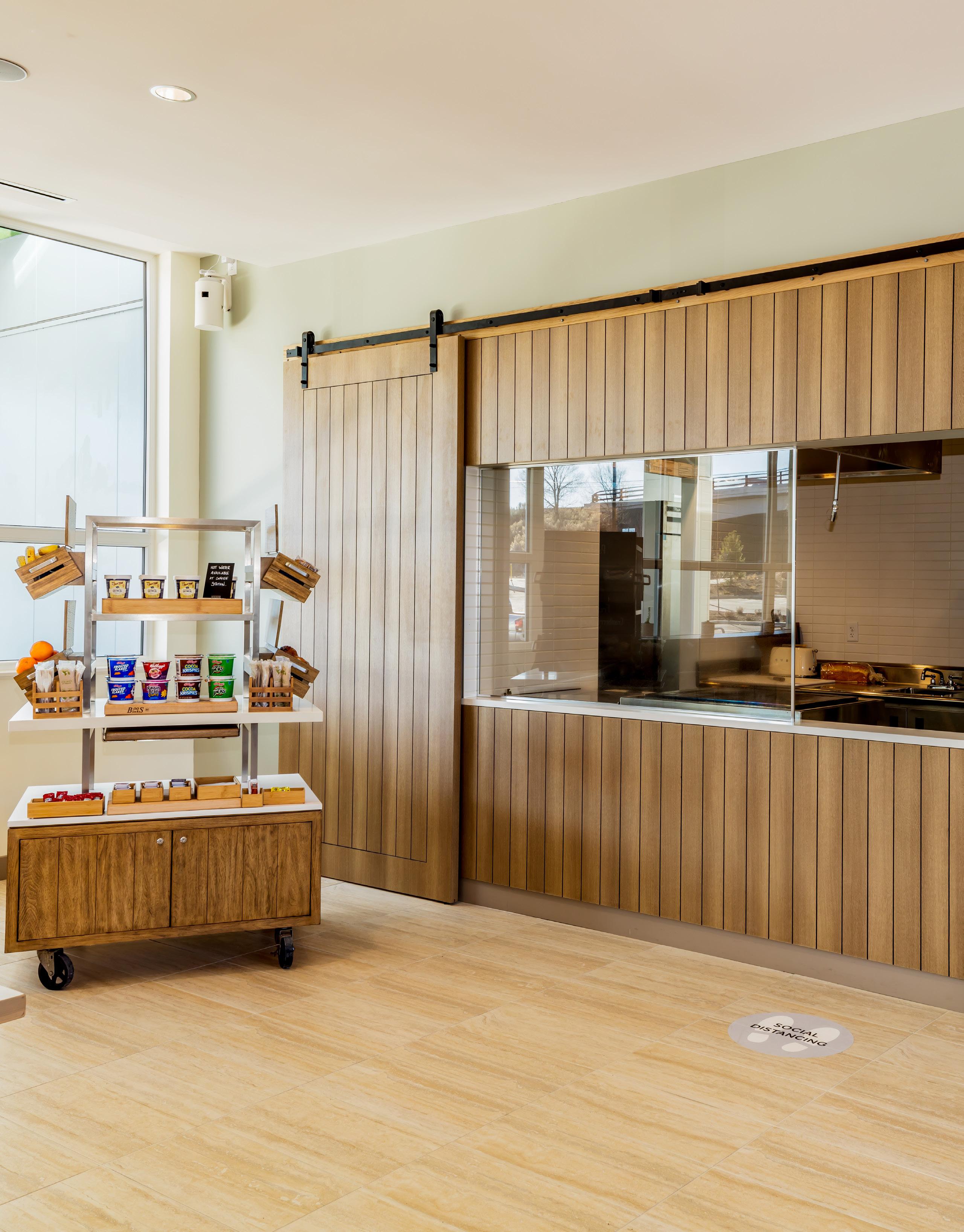
10 minute read
Rebuilding Consumer Confidence
Safety, Quality, and Great Service Help Move the Industry Forward
At a time when more consumers are beginning to venture out of their homes and into restaurants, bars and lodging properties, it's critically important to continue to maintain consumer confidence and build assurance of safe practices within the industry. Safety has become a differentiator on par with quality and service, so adopting a safetyfocused culture and communicating key information to potential patrons is key to getting back to “business as usual.” We asked four hospitality companies to share what they’ve been doing to establish best practices for safety and communicate that information to their guests.
Advertisement
As of right now, industry professionals see no end in sight when it comes to enhanced cleaning and sanitizing. “We’ve asked ourselves, ‘What would our customers want us to do whether we think we need to do it or not?’” said David Anderson, co-owner of Syndicate Wine Bar in Beaverton. “We had to listen to the worst of their fears and the strongest opinions, then step back and say, ‘That may be a strong opinion, but what is the bell curve?’” Right now, it’s about keeping an ear to the ground, understanding what customers expect and being transparent about what you’re doing to adapt to those concerns.
Beergarden, Eugene

PHOTO: COURTESY OF DELENE & CO.
“Even as the vaccine rolls out and case counts potentially go down, we’re still going to have to have these practices of sanitizing tables and maintaining spacing for a while,” said Colby Phillips, co-owner and operator of PublicHouse in Springfield and Beergarden in Eugene. “Staff will likely have to wear masks for longer—until the greater part of population is vaccinated.” People will still want to see bottles of hand sanitizer set up for their use, HEPA filters and fans running inside, and open doors and windows on warm days.
Some of the technology solutions that have facilitated social distancing are likely to become permanent fixtures in hospitality. PublicHouse and Beergarden instituted mandatory contactless ordering, which many customers have liked. The new Element Hotel in Bend, which is part of the Marriott hotel chain, allows members of its Bonvoy loyalty program to take advantage of a virtual check-in process and download a mobile key. “That’s been very well received,” said General Manager Eric Rock. “It will be like Zoom and Microsoft Teams, which will forever live in our world.”
If the expectation of elevated cleanliness sticks around for a long time, hospitality companies are certainly up to the challenge. “In the hotel industry, the safety of our employees and guests has always been our highest priority, so I’ve always believed that our industry is made for things like this because of our high expectations about cleanliness,” said Diana Steinman, director of operations, Oregon coast for VIP Hospitality Group whose properties include the Inn at Nye Beach in Newport and Inn at Wecoma in Lincoln City.
For Steinman, the pandemic has meant a greater focus on staff training and sticking to written policies. “We use hospitalgrade cleaners, so we use Ecolab to ensure that employees are trained on how to use the cleaners appropriately,” she said. “We follow the American Hospitality & Lodging Association’s training resources and guidelines that they’ve provided for the industry as well. They’ve come up with really extensive cleaning checklists for staff. Our managers are required to do continuous education and training. We have daily stand-up meetings with all of our staff. Any new resources we receive from industry leaders, we want to share those with our staff. Knowledge is power.”
Another thing VIP Hospitality Group is doing to ensure a safe environment for guests is focusing on staff health. “We’ve been a lot more aware of the importance of hand washing, with managers regularly pointing out that everyone needs to wash their hands,” said Steinman. “It’s always been
Syndicate Wine Bar, Beaverton

PHOTO: COURTESY OF DIEGO G DIAZ PHOTOGRAPHY AND SYNDICATE WINE BAR
the case that we don’t allow employees to work if they’re ill or have certain symptoms. Now, when every staff member comes on shift, we do a wellness check and take their temperature. We have a paid stay-at-home policy for staff that aren’t feeling well. If they’re sick, or if they come to work and we do a health assessment and find a problem, they’re confident that they can go home and still get paid. That allows the employee to be really honest about how they’re feeling, which is really important.
“We can’t control what our employees do outside of work, but in our training, we encourage employees to avoid high-risk situations in their personal life,” she added. “We haven’t had any issues up to this point.”
Keeping guests safe and still giving them that all-important sense of hospitality has required some creative solutions during the pandemic. When outdoor dining finally became an option in the Portland suburbs, “we designed an outdoor space that could be set up and taken down in 15 minutes,” said Anderson. He and his wife / business partner, Angela, bought collapsible picnic tables, built their own stanchions when none were available at the local hardware store, and braided cords into ropes to further separate different seating areas.
“We turned our street from a pandemic zone into a socially-distanced community,” Anderson said. They invited local musicians to play for guests—from a safe distance, of course. When the bar had to shut down its kitchen, it began allowing guests to bring takeout or food from home. Syndicate even came up with wine pairings for dishes being sold by neighboring restaurants to encourage patrons to visit them first.
“Since we were told we couldn’t drive to the beach, we said, ‘Let’s bring the beach to Beaverton,’” Anderson said. They created outdoor dining cabanas with Adirondack chairs, umbrellas, inflatable parrots and beach balls. “We said, ‘Let’s make the experience fun and help customers relax or laugh.’ In hospitality, that’s what it’s all about.”
In the fall, when he knew the rain would be coming back, he found a large tent so that the bar didn’t have to shut down the outdoor gathering area. In the winter, the cabanas became wine igloos thanks to smaller tents that kept the warmth inside and the cold air at bay.
“The idea was, again and again, what can we do to make our space a place that people come to in the middle of pandemic to relax and get away from the pandemic and get back to a sense of normalcy even during hard times,” said Anderson.

Natatorium at Element Bend, Bend

PHOTO: COURTESY OF ELEMENT BEND
One of the Element Hotel’s creative adaptions was to allow people or families to sign up to use the pool and fitness center in shifts. “A family will sign up for a 1 p.m. time for the pool, for example, and they’ll use it for 45 minutes,” Rock said. “For the next 15 minutes, we go in and disinfect it to get it ready for the next group.”
It has also used some more standard processes to give guests and staff a greater feeling of safety. Breakfast items are packaged rather than set out on a buffet. The hotel does one hot item a day, but it’s prepared in the kitchen and passed directly to guests through a window that is almost completely covered with a plexiglass shield. Room service has been cut to once every four days, and guests have to be out of the room for at least an hour before a housekeeper will enter.
Companies can have the best processes and procedures in the world, but if guests don’t know about them, they may not feel comfortable returning to their favorite restaurants and hotels. That’s why communication, not just policy changes, is critical to restoring consumer confidence. “One of the things that we’ve tried to do is have lots of very friendly signage explaining the rules,” said Phillips with PublicHouse. Large banners hung throughout the restaurants make it easy for people to spot and review the policies.
In addition, both of Phillips’ restaurants have a greeter who welcomes every guest. “Our staff proactively talks about our rules and how we’re handling things,” he said. “Sometimes we have to remind people what the rules are or teach them. I think that helps alleviate potential issues. Not all of them, but most of them.”
VIP Hospitality Group has taken several steps to communicate its COVID safety protocols. “When they receive their confirmation letter, it lists out a lot of what our guests can expect during their stay: temperature checks for staff, contactless checkout, toiletries that are individually wrapped,” Steinman said. “We can provide them with a mask if they don’t have one. If a guest makes a reservation over the phone, we share this information with them verbally. This information is also on the website, and we provide links to county websites so people can see our local requirements and what restaurants are or aren’t open.”
“Social media is a big communication tool for us,” said Anderson. “Some days we’ll post two, three, four times a day because we have so much content.” Updates can be more serious, such as when government agencies institute new mandates or the bar’s service hours change. They can also be fun, announcing live music or sharing a joke or lighthearted thought for the day. “I’ve always had a dry sense of humor, but now that my son is 15 years old, it’s a dry sense of dad humor,” Anderson quipped. But, he added, in all seriousness, “If I can get you to laugh, maybe I can get you to forget the craziness of the world for a minute. When I go back through our social media posts from the past year, we’ve always had a positive message. We always kept it upbeat, and our customers really valued that.”
Syndicate’s communications have also provided a strong and consistent position on safety protocols, which Anderson believes has been very important. “People are desperate for leadership,” he said. “They’re desperate for guidance right now. Things are constantly shifting. They’re getting inconsistent guidance from the government. We figured out what we could do and were consistent with our message. We did not want to pass uncertainty and fear onto our customers.”

Steinman encourages all hospitality companies to keep up these good, proactive communication measures, as well as extra safety protocols, for as long as it takes. “Guests need to see that all of these industries, from airlines to cruises to restaurants, are working together,” she said. “They need to know that every industry leader is working together to provide training to the employees that work in these different travel industries. That gives travelers confidence that employees are being trained properly and the organizations they work for are providing tools and resources to deliver an experience that’s great but also safe.”
Anderson echoes these ideas. Even a year into the pandemic, it’s easy to not know the best way to handle workplace issues or bring customers back. “The anxiety is there for all of us but know that your neighbors are in the same situation as you,” he said. “Don’t be afraid to reach out for help. In the hospitality industry, we’re all in this together.” SOPHIA BENNETT
New On-Demand Course

Providing Service While Supporting Safety
Guest Service Tips During Covid-19 Challenges
This online course is scenario-driven addressing common guest service challenges restaurant and hotel staff are experiencing during the pandemic. Choose from a restaurant or hotel version, available in English and Spanish.
Skills Participants Will Learn:
• Guest-friendly communication of safety procedures and expectations • Creating and reinforcing organizational credibility with safety practices • Approaching a non-compliant guest with the goal of avoiding escalation • Creating positive guest experiences despite potentially awkward safety protocols
Course is available for a donation. Funds will help support the Oregon Hospitality Foundation’s mission to provide timely resources such as this course, in addition to operational funding needed to support programs for the hospitality industry’s workforce and philanthropic needs.
SPONSORS AND PARTNERS










